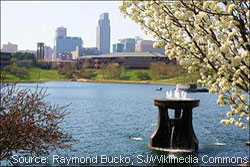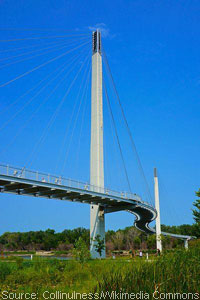 With no demographic boundaries, the recent recession has entered homes across the United States. However there is hope in Omaha, Nebraska. According to Forbes Magazine, Omaha was rated the "Best Bang-For-The Buck City," and one of "America's Fastest-Recovering Cities" in 2009.
With no demographic boundaries, the recent recession has entered homes across the United States. However there is hope in Omaha, Nebraska. According to Forbes Magazine, Omaha was rated the "Best Bang-For-The Buck City," and one of "America's Fastest-Recovering Cities" in 2009.
Omaha's rave financial reviews reflect the outstanding tourism the city offers, making the Midwestern metropolis not only a great place to visit, but also a bountiful place to live. Home to five Fortune 500 companies and the annual College World Series, there is constant growth and movement in this Missouri River residence.
If you're considering making a move to the Midwest, Omaha may be exactly what you are looking for. Take time to peruse this guide to get a better understanding of the unique city and all it has to offer.
Omaha Climate
Average summer, fall, winter and spring temperatures make up Omaha weather. With hot summers and cold winters a fair amount of rain and snow fall on the city throughout the year.
During the spring and summer, severe seasonal thunderstorms come through Omaha, with the month of May averaging approximately 4.57 inches in rainfall. Yearly, the city sees an average of 29 inches of rain, so make sure you have a couple of extra umbrellas convenient if choose to move.
Like rain, snowfall averages around 30 inches annually, with some heavy storms falling through December, January and February. You should not mind shoveling some snow if you relocate to Omaha, but rest assured, the average winter temperatures in the 30s make the city bearable.
Spring and fall temperatures are standard, ranging anywhere between 50-70 degrees Fahrenheit. Located in the Midwest and off the Missouri River, the longest waterway in North America, Omaha attracts humidity from the East and the dryness from the West, making the state climate steady and somewhat comfortable all year through.
Omaha Neighborhoods
Omaha is divided into several distinct demographics. Downtown, Central, North, South, and West Omaha are all unique, offering a different atmosphere in each area. Downtown Omaha, the hub of the city, is avant-garde and ancient at the same time.
 Though hip culture can be found along the concrete walkways, a taste of the past can be discovered on the cobblestone streets of the Old Market District. From gallery gazing, sidewalk shopping and decadent dining, there is never a dull moment downtown.
Though hip culture can be found along the concrete walkways, a taste of the past can be discovered on the cobblestone streets of the Old Market District. From gallery gazing, sidewalk shopping and decadent dining, there is never a dull moment downtown.
Like Downtown, Central (Midtown) Omaha is made up of a contemporary and a historic style. A complex community made up of new schools, hospitals and businesses, many Midtown locations are also noted on the National Register of Historic places. The combination of old and new complimented by parks and clubs is a great place to call home.
Home of the Mormon Trail Center, North Omaha is the oldest neighborhood. With an abundance of African American History, the area is famous for jazz greats like Count Basie. Home to community colleges and four-year universities, the district is strong in education and religion. South Omaha is a great place to settle. The former "Magic City", is made of many immigrants, providing a diverse and cultural community.
Lastly, and like other areas, West Omaha is both historic and new. While home to Boys Town, the renowned non-profit organization founded in 1917, the area's new architecture has created comfortable living and shopping spaces where thousands of families live and frequent.
Registering Your Car
If you choose to call Omaha your home, changing your license and registering your vehicle are one of the first chores to take care of. Before taking a trip down to the local Division of Motor Vehicles, so that you can become familiar with the city and state's licensing rules. But do not delay since a new resident only has 30 days to register for a Nebraska title and registration.
Nebraska requires that new residents supply at least one form of identification with their name and birth date and two forms ID that show their current, local address to obtain a license. The required forms of identification needed to obtain a new Nebraska license can be found on the noted website.
Omaha Schools
Omaha Public Schools, or OPS, is the largest school district in the state. The Douglas County district has almost 50,000 students and approximately 80 schools in the system, creating a large community of students throughout the region. Staffing more than 7,000 employees, the system prides itself on its highly educated teachers.
According to OPS, their teachers' average experience is 11.7 years, with 43% of the educators holding advanced degrees. Along with the public school system, Omaha offers private schooling, providing approximately 17,000 students with an elite education.
Omaha offers the choice of seven colleges and universities in the city. The higher education institutions are Clarkson College, College of St. Mary, University of Nebraska Omaha, Metro Community College, Creighton University, Nebraska Methodist and Grace University. Whether you are a local or from out-of-state, Omaha is an outstanding city to learn in.
Omaha Employment
Only four years ago, Forbes magazine ranked Omaha as one of the most prosperous places to live during the recession. With a low 4.2% percent unemployment and home to five large Fortune 500 companies, Omaha has promising career prospects. Compared to the Bureau of Labor Statistics average American unemployment rate that presently ranges around 7.7%, the river city may just be the place to start a new career.
Living Costs in the City
According to the 2011 city budget, the median household income in Omaha was $67,567 and the median price for a home was $133,700. However, the overall cost of living depends on a family size. While an average home is priced around $130,000, renting may be more affordable.
Some Omaha homes for rent range anywhere from $900 to $1,300 per month. Of course the price of the rental rises with the amount of rooms rented. Omaha apartments are less expensive to rent than a home, averaging anywhere from $550 to $900 for a one- to two-bedroom place. Utility costs will vary depending on the size of the residence, with electric, gas and water bills averaging between $50 and $100 each. However the more you use a utility, the higher the bill will be for that month.
Omaha Moving Resources
Making the move to Omaha is a big decision. Once decided, it is important to choose a reputable moving company to assist you in your relocation. Compare prices between companies and consider the types of moving services. It is also important to avoid moving scams, avoiding less reputable services that perform in an unprofessional manner.
Visit Movers.com to find all you need to know about making the move to the Midwest.
Omaha Transportation
From riding bikes, to hopping on the metro to traveling major highways, there are plenty of ways to get around the city. While most residents own their own vehicles, many residents depend on public transportation to get them around the 128-square-mile metropolis. Located on the banks of the Missouri River, the city offers the opportunity to ride on the water for pleasure on the River City Star riverboat.
Culture & Contemporary Life
 Though it is the Midwest, don't let Omaha's location fool you. The middle of America is full of fun, buzzing with family friendly entertainment. From museums and zoos to art centers and theaters, one can enjoy any activity at a moment's notice.
Though it is the Midwest, don't let Omaha's location fool you. The middle of America is full of fun, buzzing with family friendly entertainment. From museums and zoos to art centers and theaters, one can enjoy any activity at a moment's notice.
All that running around would make anyone hungry, which is perfect because Omaha's diverse dining experience offers something for everyone. However, if you like steak, the city's reputation for choice cuts of meat is sure to make you want to order seconds.
When you are not shopping or enjoying the day spa, a round of golf at any of the 16 public and semi-public courses will make your day. But what is really great about Omaha, is all the free activities available for all ages. Music lovers can enjoy Jazz on the Green concerts and children can traipse the Mormon Trail without it costing a penny, making Omaha a great place to visit and live.
Omaha Relocation Tips
- Do not make the move to this Midwest city unless you have a new job, friends, or family to arrive to. Like any move, if you are not prepared you can find yourself facing the unexpected with no familiar resources to turn to.
- Before making Omaha your home, take a trip to the city and discover its past before you decide to prepare for your future there.